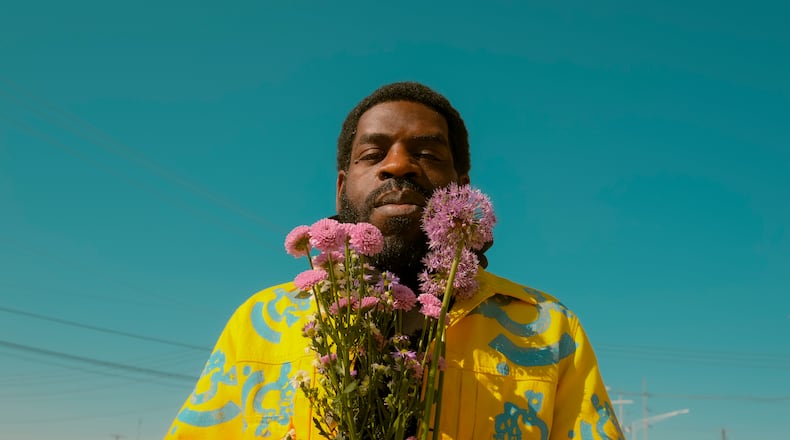Abdurraqib is an award-winning poet, essayist and cultural critic from Columbus. His essays and music criticism have been published in The FADER, Pitchfork, The New Yorker and The New York Times.
His latest release, “There’s Always This Year: On Basketball and Ascension” was a New York Times Bestseller and longlisted for the National Book Award in nonfiction and the winner of the National Book Critics Circle Award for Criticism. In 2021, Abdurraqib was named a MacArthur Fellow, and in 2024 was named a Windham-Campbell Prize recipient. He is a graduate of Beechcroft High School.
Ahead of his reading, Q&A and book signing, I spoke with Abdurraqib about his writing and his thoughts on modern arts criticism as he roamed the streets of his hometown.
How did growing up in Columbus originally inform what it is that you do?
HANIF ABDURRAQIB: I grew up in the Greenbrier area, a place that was deemed “Uzi Alley.” Got that nickname by the city, you know, because the city feared it in a way. One thing about coming up in an area that is neglected in any way or ignored by the powers that be, or treated like a war zone, treated like a place that’s too dangerous to live, is that the people who live there do not designate it as such.
I really love where I’m from, and I really love the people where I’m from. I love the guys who hang out outside the corner store. I love the guys in the barber shop. I love the elders of my community, and I think they deserve to have as large of a presence in the universe of my work as a pop star or an athlete does.
There’s definitely poetry to all of that you’re talking about. Coming up, what was the poetry and music scene like?
ABDURRAQIB: I didn’t get into poems until like 2011, 2012. The scene was massive, but I came up on the punk and hardcore scene in the Midwest, in my late teens and early 20s. There’s a rich poetry scene here… jazz, hip hop. But when I was coming up, there was music in my house, in my neighborhood. My dad played a ton of instruments. All my friends’ parents had instruments. I came from a house where everyone had their own universe of music tastes.
There were pathways to music so early on for me, and I was really lucky to kind of fall into a punk scene that was welcoming. It made a really good home for me when I felt like an outsider.
Being a part of that punk scene, were you writing for rags?
ABDURRAQIB: I wrote for a local zine here. I was like 20 or 21, and I did it solely out of necessity, because no one else wanted to write in it. I think people loved having zines for art and for photos. But writing is also an important component of that. I thought the main function I could serve, as someone who went to a million shows all the time, was to treat it like reporting.
I was reporting from the ground site of what I witnessed. And I wanted to make what I was witnessing feel larger than life, even if it was just a house show in someone’s basement, which it often was. I wanted to make that experience feel touchable and enviable to people who were not there, because if I did that, it would in some ways expand the community.
With these scene reports, at what point does the music criticism happen?
ABDURRAQIB: Around that time, Columbus had a bunch of alt-weeklies. And the good thing for me about that is that if you have a bunch of alt-weeklies, you just have to fill them. So I was writing reviews for these big pop albums because no one else wanted them. And that really honed my critical ability, because some of these albums I liked, but some of them were from artists I wasn’t a fan of.
I had to force myself out of a good-bad binary and ask: with what I know of this artist, does it seem like they’re achieving what they set out to achieve? That’s a question that allows me to be more curious as a writer and as a critic, and to be much more of a close listener.
I like to say the best compliment I can give an artist is thinking about what they do. Even if I don’t necessarily like their art, I can typically appreciate something about it. I feel that you can do the same.
ABDURRAQIB: It does require a level of close attention and labor that I think is important. And you don’t endorse something like that if you don’t have a genuine interest and curiosity in others.
How do you see the role of the critic today, especially considering people can spout their opinions online at any time?
ABDURRAQIB: I think criticism is more than an opinion. Criticism is contextualization. Criticism is also making something enticing for someone who maybe does not love it yet. If you don’t love something, there’s a way to contextualize that dislike with a depth and rigor that does not turn people off to it, but asks people to listen to it differently.
Who were you reading when you decided that writing would be your life?
ABDURRAQIB: I came up reading fiction and only fiction, which is a very interesting thing, because I don’t write fiction. We didn’t have a ton of money for books. The books we had in the house were my mom’s books, and my mom was a lover of fiction. When I started writing about music, it was Lester Bangs.
I loved Lester Bangs, and I loved Greil Marcus. Lester Bangs wrote about The Clash as if I already knew who The Clash was, and Greil Marcus wrote about Sly Stone, or these other groups, as if they were already in my universe. And that was important to me, because it gave me an opportunity to seek them out on my own.
How do they inform each other, the poetry and the essays?
ABDURRAQIB: My pursuit first and foremost is engaging in beautiful language. I stopped writing criticism for a handful of years. Editors back then stopped taking my reviews because they said they were too poetic and too meandering. And so I went away to study poems, on my own, in my house. My heart is so eager to be dragged somewhere by my brain, and I don’t think about those as diametrically opposed forces. I think about them as intertwined. Sometimes nonfiction has to be rhythmic and it has to be musical. It has to be unafraid of using a metaphor or an image that occurs and reoccurs, all of this kind of play and freedom that exists in the poem. It is not antithetical to nonfiction, and I have to remind myself of that repeatedly.
In your essays, specifically, is there a prerequisite that you must hit in your ideas that makes a particular thesis worth chasing?
ABDURRAQIB: I guess this is the primary prerequisite: is this something that is valuable and interesting to anyone beyond me? I’m someone who I get very deep in my own obsessions, and in the depth of those obsessions, it’s so easy for me to think that everyone is equally as excited about something as I am. I try to bridge that gap between saying, understandably, no one is going to be as obsessed with this as I am, and can I get a little closer to a point of interest?
Will you be doing readings from throughout your career or are you focusing mostly on the latest work?
ABDURRAQIB: I’m going to read some stuff from “There’s Always This Year,” and I will read some new poems. I travel so much, and I’m all over the place. But to read in Ohio means so much to me. I love Ohio deeply, and I love Yellow Springs, specifically and especially. I’ve never read there before. I’m going to read some things that other people aren’t going to hear anywhere else. I feel like I owe that to this place.
For more info on Hanif Abdurraqib, visit abdurraqib.com.
Brandon Berry covers the music and arts scene in Dayton and Southwest Ohio. Reach him at branberry100@gmail.com.
HOW TO GO
What: Hanif Abdurraqib reading, Q&A
When: 7 p.m. Sept. 30
Where: The Foundry Theater, 920 Corry St., Yellow Springs
Cost: $15
Tickets: antiochcollege.edu/event/hanif-abdurraqib-at-the-foundry-theater
About the Author


